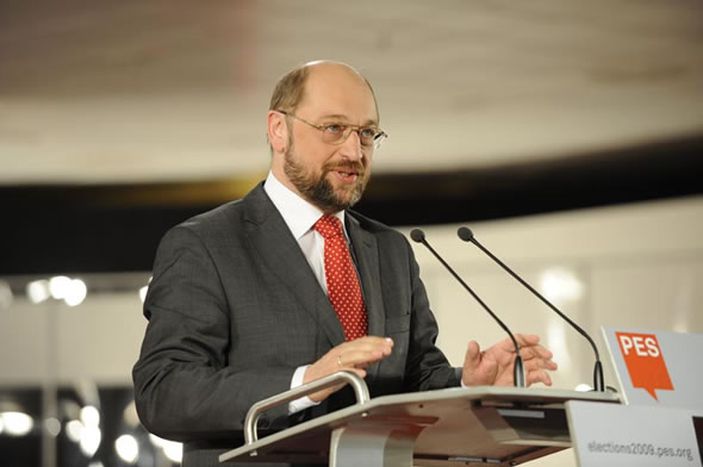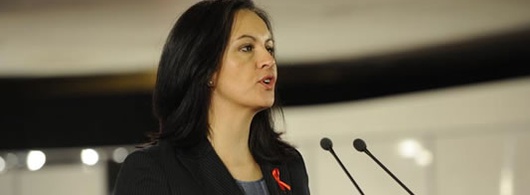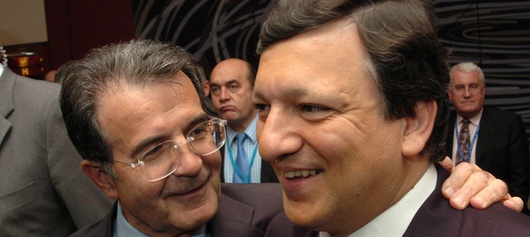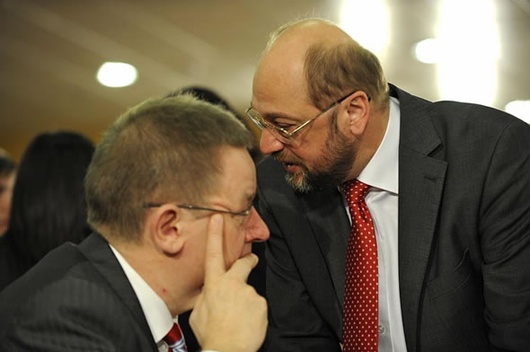
Martin Schulz on 'vague' Barroso: 'one day he is left-wing, the next liberal'
Published on
Translation by:
 Kate Stansfield
Kate Stansfield
The German leader of the socialist group in the European parliament outlines their strategy in the run-up to the European elections in June 2009. How does he plan to win the elections? Interview
He has just given a speech to one thousand people - a very rabble-rousing address, leaping from one language to another in a display of total public-speaking prowess. We are in Madrid, at the council of the party of European socialists. Nearly all its leaders are concentrating on winning the elections and, for the first time in the history of the EU, there will be a party with an electoral manifesto.
For the first time in the history of the EU, there will be a party with an electoral manifesto
The socialists are trying not to seem repetitive, but they talk about New Social Europe in the same way we heard talk of New Labour, and they go on about Obama's Yes we can in unison everywhere they go. Their war cry for June 2009? People first. It remains to be seen whether they are capable of presenting one of their own people to run against the conservative José Manuel Durão Barroso for the presidency of the European commission.
Do you think the European socialists will gain more seats in the European elections of June 2009?
I have two reasons to be optimistic. The socialists have just adopted a manifesto that responds to both immediate needs and to the long-term debate about Europe. Furthermore, the right and centre-right are in power in twenty countries, and they are in bad shape, so the socialists will increase their members. I am aware that we will also lose in some areas.
You predict that the Tories in the UK and the Czech Republic’s ODS are going to split from the European people’s party and that socialists will therefore succeed in becoming the party with the most seats. But British prime minister Gordon Brown is not here today. Do you think the labour movement in England is supportive of European politics and European socialism?
 Brown couldn't be here due to prior engagements, and sent two former ministers of the highest level to represent him: (minister of states for Europe) Dennis MacShane and Caroline Flint (pictured, left). The coherence of the socialist family is greater than ever.
Brown couldn't be here due to prior engagements, and sent two former ministers of the highest level to represent him: (minister of states for Europe) Dennis MacShane and Caroline Flint (pictured, left). The coherence of the socialist family is greater than ever.
Can you give us an example of this coherence?
The manifesto we have just adopted…
And a more parliamentary example?
The famous services directive (commonly known as the Bolkestein directive) was rejected by the party of European socialists en masse. The socialist group refused en masse to give its vote of confidence to the Barroso commission when it took office. We have also been the instigators of the REACH directive on the use of chemical substances in industry. This proves the cohesion of the socialists…
A cohesion that has been broken in recent months with the vote on the directive on the return of illegal immigrants and the directive on the 65-hour working week…
Well yes, but this is normal. In the vote on the Returns directive there was significant voting coherence, except for two delegations, including mine, the German delegation. But this is not representative. The Return and Work directives are different to the REACH directive. The first two have more to do with national interests. My strategy has always been clear: we have a level of voting coherence of 85% among the members and we are a bloc of 201; what I have always tried to do is to scrape around amongst the closest political minorities in order to put together majorities in the European parliament. And we have had a great deal of success!
Which minorities are you referring to?
I am referring to the social christians within the European people’s party. Jean Claude Juncker’s people. There are so many delegates in Belgium, Luxembourg and Holland who share his views! And the statist wing of the French gaullists too, who are more or less on the same wavelength. They would rather ally themselves with us than with the British Tory party.
Does Barroso deserve a second term at the head of the European commission?
 Barroso had a very rocky start. Over the past four years, I admit that he has understood how to better organise the European commission. Within the commission he has become a very effective president. However, in terms of his politics, he is a very vague person. One day he is left-wing, the other he is liberal, the next he is conservative. We want a socialist at the head of the commission, but unfortunately it is the European council that nominates…
Barroso had a very rocky start. Over the past four years, I admit that he has understood how to better organise the European commission. Within the commission he has become a very effective president. However, in terms of his politics, he is a very vague person. One day he is left-wing, the other he is liberal, the next he is conservative. We want a socialist at the head of the commission, but unfortunately it is the European council that nominates…
But the parliament could refuse to give him their vote of confidence, couldn’t it?
Yes, but first we have to wait for the council’s proposal. If they nominate Barroso again, he must avoid being the candidate of a party. A majority vote in parliament depends on us and we have already put forward conditions. For a start, an outline agreement between the commission and the parliament on the ‘social impact assessments’ of the policies it is developing.
But doesn’t democracy mean a party as well as a candidate or person who embodies that party’s agenda?
 I know it is difficult to digest, even for me. Your question describes democracy on the basis of power sharing within the constitutional framework of a sovereign state, but the EU is a union of sovereign states, not a federal state. Maybe it is a federation of states. In any case, it is not a sovereign state with a two-chamber parliament and government etc.
I know it is difficult to digest, even for me. Your question describes democracy on the basis of power sharing within the constitutional framework of a sovereign state, but the EU is a union of sovereign states, not a federal state. Maybe it is a federation of states. In any case, it is not a sovereign state with a two-chamber parliament and government etc.
How do we explain this to the abstentionists, who see no interest or attraction in European politics?
People vote first and foremost for a political agenda and then for a candidate. If we have a good combination of the two, even better. If the Lisbon treaty is adopted in 2014, we will be able to have this combination, and the parliament would be the one to vote in the president of the commission.
I would love there to be personalised political confrontation for the elections, but the Irish prevented us from having this
On the basis of the treaty of Nice, the council nominates and the parliament decides whether or not to approve it. It is very different. I would love there to be personalised political confrontation for the elections, but the Irish have prevented us from having this.
Translated from Martin Schulz: “Los irlandeses nos han impedido presentar candidatos a presidente de la Comisión”


